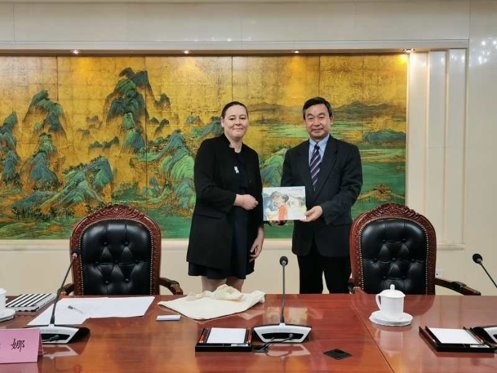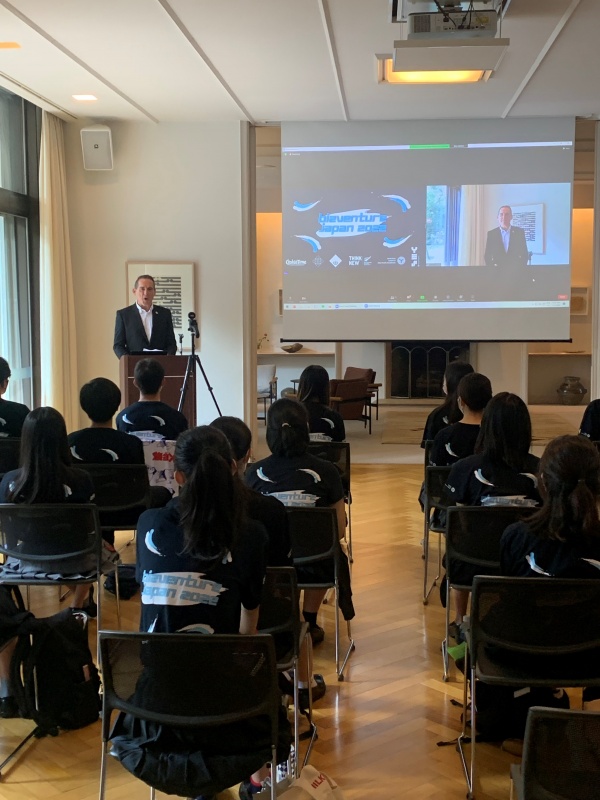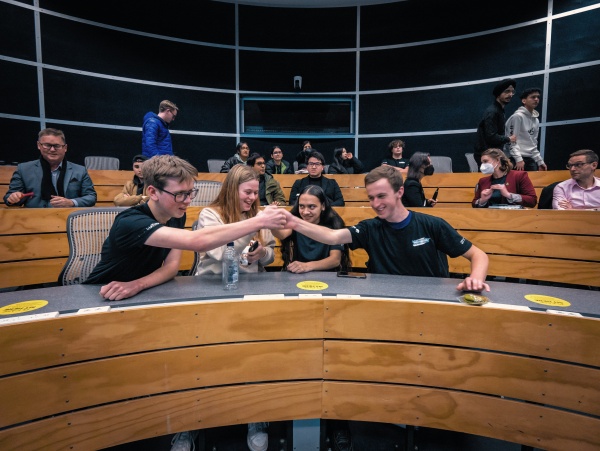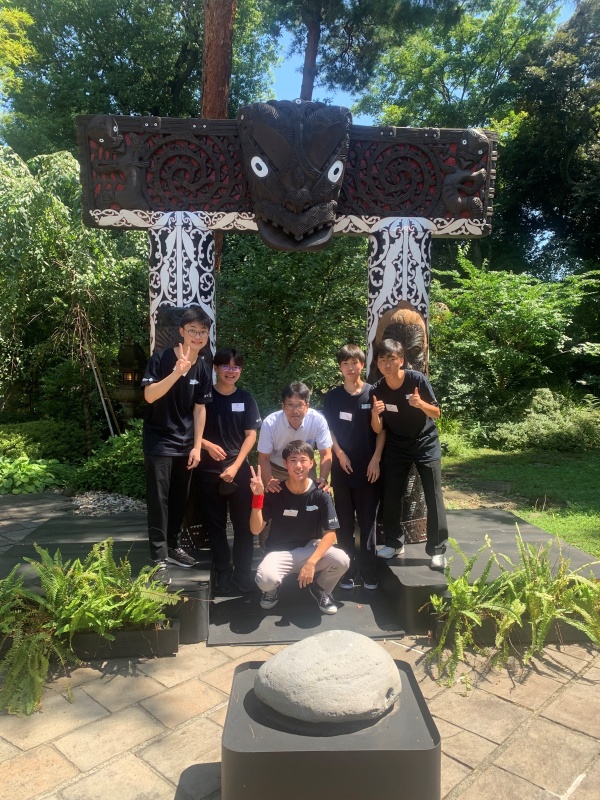Search
Showing 10 of 1867 results for how to register international groups
-
Kōrerorero on quality education
Panellists included
- Dr Dawn Freshwater, Vice-Chancellor at the University of Auckland, who is also the first woman to hold this role
- Dr Sandra Regina Goulart Almeida, Vice-Chancellor at the Federal University of Minas Gerais (UFMG) in Brazil
- Dr Alejandro Ceballos, Vice-Chancellor at the Universidad de Caldas in Colombia.
With simultaneous interpretation in Spanish and Portuguese, the session attracted more than 100 attendees and 350 registrations from across Latin America and Aotearoa New Zealand. Panellists shared their thoughts on gender equality, integration, and inclusion, and how to achieve more equitable access to quality education. They also discussed the main priorities and focus of their institution in relation to SDG 4, and how they overcome challenges to achieve the SDG’s objectives.
Education New Zealand Manapou ki te Ao’s Kōrerorero webinar series is intended for academics, education agents and media in Latin America and New Zealand. It has been particularly effective in maintaining awareness of a New Zealand education while our borders are closed, while also contributing to discussions on important matters related to international education. Across the six episodes since its launch in 2020, more than 1,000 people have attended, with many subsequent views on YouTube.
If you would like to watch this episode, please click here
-
Research communication platform for Asia-Pacific
The Context: Asia-Pacific is where you can get quick, plain language overviews of high-quality academic research. Recent stories include one about cultural intelligence research. Other examples include the capabilities that SMEs need to succeed in international markets.
The platform will also include youth voices from tertiary students interested in global engagement. You can subscribe to email newsletters to receive updates about your area of interest.
The Centres of Asia-Pacific Excellence were established by the government in 2017, to support New Zealanders to engage with North Asia, Southeast Asia and Latin America.
-
BizVenture Japan back for 2022 with new partner onboard
This year will see 30 students from New Zealand and 20 from Japan come together in person and online from 29-31 July, to solve real-life business challenges. Students will develop and pitch solutions for Cookie Time, a New Zealand business that has been exporting to Japan since 2016.
After the successful pilot event last year, BizVenture collaborators have bigger plans for 2022. Misa Kitaoka, ENZ’s Director of Education – Japan, is looking forward to hosting the Japanese team and Cookie Time Japan at the New Zealand Embassy in Tokyo for the business challenge pitches.
“We are delighted to welcome Cookie Time Japan to BizVenture 2022 as a corporate partner. Cookie Time Japan is an ideal partner in this project. While embracing the Kiwi entrepreneurial spirit, the company has done an amazing job developing products which cater to local demands and preferences, particularly in the youth market.”
Last year’s BizVenture collaboration saw the students exposed to business and culture in both countries during a weekend of interactive workshops with New Zealand and Japanese guest speakers, cultural mentors and language coaches, in preparation for their pitches.
Ian Kennedy was a judge at BizVenture Japan 2021 and is the Chair of the New Zealand Committee on the Japan New Zealand Business Council, a role that brought him back to Japan in April during the Prime Minister’s visit. He is looking forward to the next iteration of the programme with the 2022 participants.
“Technology is a wonderful thing, but the chance to meet people in person was gold after two years of online communication working through a screen. I look forward to being a judge and sharing my recent experience in Japan business exchanges with the BizVenture participants, so they can learn more about doing business with Japan.”
Applications for New Zealand students to participate closed on 13 May and selection will be completed by the end of May. The 30 New Zealand students are being selected from the nearly 4700 students participating in The Lion Foundation Young Enterprise Scheme.
Funding is provided for New Zealand students to travel to Wellington for the weekend business challenge event.
“I felt inspired after seeing the students' business cases, which were commercial, socially minded, and demonstrated thoughtful engagement in each other's cultures. North Asia CAPE is thrilled to work with Young Enterprise, ENZ and Japanese partners again on this important initiative in support of future business leaders in New Zealand and Japan,” says NA CAPE director Charlie Gao.
The programme is designed to continually build on New Zealand’s diplomatic relationship with Japan as travel for international students is starting to resume. The organisers hope this year’s BizVenture will serve as an important show of commitment by New Zealand and Japan to develop global citizens and business-savvy young people, who will be future leaders in the education and business sectors across our two countries.
About BizVenture
The 2022 BizVenture Japan Programme is an initiative co-hosted by Education New Zealand, North Asia Centre of Asia-Pacific Excellence, education partners in Tokyo, Japan and facilitated by the Young Enterprise Trust.
BizVenture Japan is supported by the New Zealand Embassy in Tokyo and Embassy of Japan in Wellington. Cookie Time New Zealand and the Cookie Time Harajuku store have kindly offered to be the focal business for the latest business challenge.
ENZ contact: Misa Kitaoka, Director of Education – Japan, misa.kitaoka@enz.govt.nz
-
Showcasing New Zealand education in Saudi Arabia
Education New Zealand Manapou ki te Ao and New Zealand providers were among 250 exhibitors from 21 countries at ICEE 2022. The New Zealand pavilion hosted representatives from University of Waikato, Victoria University of Wellington, and University of Otago, two English language providers – Languages International and Worldwide School of English – and four EdTech companies: Education Perfect, TTRO, ByteEd, and ADRI.
The delegation presented a workshop on New Zealand as an education partner for Saudi Arabia, showcasing New Zealand’s education offering across key sectors: EdTech, English language, universities, and vocational training.
ICEE provided an opportunity for delegation members to meet with key contacts in the Saudi Ministry of Education to support opportunities for New Zealand EdTech companies, discuss the implications of the Saudi Government’s new scholarships strategy for New Zealand universities, and look at potential cooperation between the Saudi Technical and Vocational Training Corporation (TVTC) and the newly created Te Pūkenga.
-
ENZ wins gold at India’s Kaleido Awards
The annual Kaleido Awards showcase excellence in communciations and public relations, and attracted 500 entries this year.
ENZ’s win was for the campaign, “Unlock Potential for the New You”, developed as a way of responding to the travel restrictions caused by COVID-19, and the need to maintain a pipeline of students interested in higher study with New Zealand.
The campaign focused on bridging the learning gap for all our local stakeholders – students, partners, industry experts, teachers, and agents. A series of events was organised, including masterclasses for students, a media training session for education agents, and a Women of the Future summit to celebrate International Women’s Day. The idea was to showcase the varied ‘newer’ learning prospects available in New Zealand.
These learning opportunities were supported by content across a range of social media channels. We also engaged with prominent journalists and provided news stories. The campaign saw a 50% increase in student applications for different courses at New Zealand universities, along with a 75% increase in inquiries about study with New Zealand.
-
Photo book to spotlight New Zealand’s strong education relationship with China
The photo book will be a special opportunity to reflect on the strong education relationships between New Zealand institutions and their partners in China.
Please submit your high-resolution (resolution above 300dpi) photos to the ENZ China team at china@enz.govt.nz by 15 August 2022.
To be included in the book, photos need to include captions and full information. If we receive a high number of photos, it may not be possible to include all submissions.
Please include the following information for each photo:
- Event/occasion
- Location
- Date
- Name, title and organisation of the people in the photo, including their location in the photo
Example:
Miranda Herbert, Director of Education – China, Education New Zealand Manapou ki te Ao (left)
Deputy Director General Xu Yongji, Department of International Cooperation, China Ministry of Education (right)
3 June 2020 – face-to-face meeting at the Ministry of Education in China.

The Chinese Ministry of Education welcomed Miranda, saying at the time that it was their first meeting with any foreign Education Counsellor post Covid-19.
-
First research projects funded through NZ Centre at IIT Delhi
Ten projects will each receive seed funding of USD10,000 for one year, half funded by IIT Delhi and half by the New Zealand university involved.
The New Zealand Centre at IIT Delhi was established in February 2020 as a focal point for joint academic activity between New Zealand's eight universities and IIT Delhi.
The purpose of the Centre is to promote relationships of understanding and co-operation across diverse fields of academic and other sector engagement between New Zealand and India. One of the Centre’s key objectives is to promote joint research projects among IIT Delhi and New Zealand universities in thematic areas of research important for both countries.
Below is the list of funded projects:
- Design of an electron cyclotron resonance based magnetically steered plasma thruster – IIT Delhi and University of Auckland
- Utilisation of Ammonia in a Spark-Ignition engine – IIT Delhi and Victoria University of Wellington
- Study on beam-to-column connections of cold formed steel portal frames for low-cost sustainable construction – IIT Delhi and University of Auckland
- Andreev reflection in twisted bilayer graphene junctions: effect of magnetic field – IIT Delhi and Victoria University of Wellington
- Deciphering the genome wide DNA methylation and transcriptomic signature of hypoxia in meningioma – IIT Delhi and University of Otago
- Discovering novel long non-coding RNA associated with epigenetic signatures colorectal cancer and dissecting their role in tumour heterogeneity – IIT Delhi and University of Otago
- Adaptive Drone swarms for precision agriculture and wildlife conservation – IIT Delhi and Auckland University of Technology
- Understanding exit choice behaviour in metro stations using virtual reality – IIT Delhi and Massey University
- Digital twin base health management of wind turbine power train – IIT Delhi and Victoria University of Wellington
- Building Code checker model on BIM structural plans using AI approach – IIT Delhi and Victoria University of Wellington.
You can read more about the New Zealand Centre at IIT Delhi here.
-
Individual applications for PM’s Scholarships for Asia and Latin America now open
“Following on from the successful group applications, the Prime Minister’s Scholarships for Asia and Latin America are now open to individual applications, and this is the only opportunity for individuals to apply in 2022,” Grant McPherson, Chief Executive, Education New Zealand Manapou ki te Ao said.
These scholarships enable talented New Zealanders who are passionate about supporting local and global communities to add an international dimension to their learning and develop their global citizenship competencies and networks.
“We welcome diverse applicants from all stages and walks of life - you don't need to be a current student, and you don’t need top grades. We are looking for applicants who can display qualities like cultural awareness, initiative, and confidence. Previous scholarship recipients have come from a wide range of backgrounds and have studied in a range of fields, including environmental science, languages, law, the arts, and business.”
More than 2,400 Kiwis have benefited from the programme since 2013, contributing to New Zealand’s ability to engage with key partners in Asia and Latin America.
The Prime Minister's Scholarship is open to New Zealand citizens or permanent residents who are at least 18 years old at the time of application and have been a resident in New Zealand for at least 12 of the previous 24 months.
Scholarship funding can be used to cover, for example, tuition fees to undertake a course in Asia or Latin America, flights to and from Asia and Latin America, living and accommodation costs, travel and medical insurance and visa fees.
More information is available on the Education New Zealand Manapou ki te Ao scholarship website here. Applications close on 31 August 2022.
-
Girls in Tech Scholarships – Indonesia
This is the second year of the scholarship programme, organised by Girls in Tech Indonesia, an international NGO focused on empowering women in technology, working with Education New Zealand Manapou ki te Ao (ENZ).
“This scholarship programme showcases a New Zealand learning experience. It also represents a commitment to support Indonesian women's development in the technology field,” says Ben Burrowes, ENZ’s Regional Director Asia.
Riza, Nurulita Aida Rahmasari, a nutritionist and one of the 2021 awardees, says she found the course extremely worthwhile: “The most exciting moment is when I completed the final project using data about nutrition in Indonesia. As someone who knows nothing about programming, I could complete the eight-week course with a simple analysis using Python. I am hoping that I can use these new skills to gather data that is useful to make a strategic decision for the government, specifically to improve conditions of Indonesians regarding nutrition and health.”
This year’s scholarship awardees have already started on their first course in data analytics with Code Avengers, a Hamilton-based edtech company focussed on digital learning. They will take part in a variety of training courses, including product management, until September. Training will be delivered by Code Avengers and by Remote Skills Academy, an Indonesian-based training provider.
"We want more women to have digital skills and to be confident using practical technologies that can open up more opportunities for them to take jobs in this field,” Mr Burrowes says.
“We also want to provide an opportunity for scholarship recipients to experience learning with a New Zealand institution, through our collaboration with Code Avengers.”
-
Entrepreneurial skills lead teams to win BizVenture Japan challenge
The business pitch challenge centred around iconic New Zealand brand Cookie Time, which has operations in Japan. Six teams of Kiwi students and four Japanese teams experienced a taste of entrepreneurship through ‘dragon’s den’ style business pitches, tackling one of two real-world business briefs.
The first focussed on the development of a new product for Cookie Time to introduce to its already established Japanese food and beverage market, supported by a three-year marketing plan.
The second focussed on the identification of a new market opportunity for Cookie Time to deliver its existing product range, either through a new sales channel, distribution model, or food and beverage sector.
While Covid-19 lockdowns in 2021 meant BizVenture Japan’s pilot year was entirely virtual, BizVenture Japan 2022 saw 30 Kiwi students from across the country flown to Wellington to experience cross-cultural education in person and present their business solutions, while Japanese students gathered at the New Zealand Embassy in Tokyo.

New Zealand’s Ambassador to Japan, Hamish Cooper, welcomed Japanese students to the New Zealand Embassy, Tokyo
The winning New Zealand team comprised Fred Sugden from Taradale High School, Tiana Manu-Griffin from Tokoroa High School, Archie MacDonald from Cashmere High School, Jackson Wright from Whangaparaoa College and Keira Hills-Wilson from New Plymouth Girls’ High School.

The winning New Zealand team
Targeted at middle-aged Japanese businesspeople looking for an energy boost, and high school students fuelling their study, the line of Enerugi Cookies and Sweet Enerugi Senbei (rice cakes) combines Japanese culture, energy and the iconic Kiwi Cookie Time brand to offer a compelling product for the two target markets.
“Energy drinks are a growing market in Japan as people seek out more energy to work and help support their families,” said Fred Sugden, a Napier local. “At the same time, we learned that parents do not give their children energy drinks as many believe it will make their children go ‘crazy’.
“By offering a product with familiar and healthy ingredients like Matcha and creating a unique spin on traditional Senbei (rice cakes), we are confident our line will be enjoyed by Japanese consumers.”
Tiana Manu-Griffin, says the exposure to Japanese business and culture helped unleash the team’s creativity as they collaborated with like-minded individuals.

Students from the affiliated schools of Waseda University and Japan Women’s University took part in the challenge from the New Zealand Embassy in Tokyo
“The best part of the competition was the ability to work directly with Japanese students and businesspeople, to understand the importance of culture and tradition in Japan. As a result, we developed a proposal that our target market loved, putting a twist on Japanese traditions and culture to reduce the use of energy drinks in Japan,” Manu-Griffin says.
“It was amazing to see what we could accomplish using our different backgrounds and experiences as a sounding board for problem-solving.”
BizVenture Japan students were mentored through a series of interactive workshops, where teams were encouraged to delve deep into the Japanese culture and business environment.
The bilateral collaboration exposed students to business and culture in both countries, with Kiwis developing their cross-cultural skills and Japanese students building on their entrepreneurial talents and English language fluency.
“I’m walking away from this experience with real-world skills and knowledge that I can take with me into university and the workplace. I now have a better understanding of how to approach business problems not only in New Zealand but around the world,” says Manu-Griffin.
Misa Kitaoka, Director of Education, Japan, for Education New Zealand Manapou ki te Ao, says the collaboration with Japan marked a special milestone.
“This year we celebrate 70 years of diplomatic relations between New Zealand and Japan. BizVenture Japan serves as a way to continually build on this relationship, as travel for international students to New Zealand continues to open up.
“With education fostering people-to-people ties and supporting the development of close connections between our two countries, we cannot wait to take this collaboration to the next level in 2023.”
The 2022 BizVenture Japan programme is an initiative co-hosted by Education New Zealand, North Asia Centre of Asia-Pacific Excellence, and Young Enterprise Trust. Education partners in Japan include Japan Women’s University affiliated schools and Waseda University affiliated schools.
2022 BizVenture Japan is supported by the New Zealand Embassy in Tokyo and Embassy of Japan in Wellington. Cookie Time New Zealand and the Cookie Time Harajuku store kindly offered to be the focal business for the latest business challenge.

